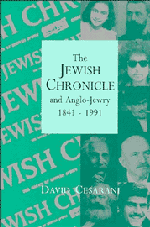Book contents
- Frontmatter
- Contents
- Preface
- Acknowledgements
- Introduction
- 1 Origins and pioneers, 1841–1855
- 2 Defining an identity: the Jewish Chronicle and mid-Victorian Anglo-Jewry, 1855–1878
- 3 The era of Asher Myers and Israel Davis, 1878–1906
- 4 The hegemony of Leopold Greenberg, 1907–1931
- 5 Discordant interlude: J. M. Rich and Mortimer Epstein, 1932–1936
- 6 Ivan Greenberg and the crisis years, 1937–1946
- 7 The post-war era: J. M. Shaftesley and David Kessler, 1946–1958
- 8 The Jewish Chronicle under William Frankel, 1958–1977
- 9 The Jewish press in a divided community: Geoffrey Paul, 1977–1990
- Conclusion
- Notes
- Bibliography
- Index
- Plate section
9 - The Jewish press in a divided community: Geoffrey Paul, 1977–1990
Published online by Cambridge University Press: 22 September 2009
- Frontmatter
- Contents
- Preface
- Acknowledgements
- Introduction
- 1 Origins and pioneers, 1841–1855
- 2 Defining an identity: the Jewish Chronicle and mid-Victorian Anglo-Jewry, 1855–1878
- 3 The era of Asher Myers and Israel Davis, 1878–1906
- 4 The hegemony of Leopold Greenberg, 1907–1931
- 5 Discordant interlude: J. M. Rich and Mortimer Epstein, 1932–1936
- 6 Ivan Greenberg and the crisis years, 1937–1946
- 7 The post-war era: J. M. Shaftesley and David Kessler, 1946–1958
- 8 The Jewish Chronicle under William Frankel, 1958–1977
- 9 The Jewish press in a divided community: Geoffrey Paul, 1977–1990
- Conclusion
- Notes
- Bibliography
- Index
- Plate section
Summary
By the time he assumed the editorship of the Jewish Chronicle in 1977, Geoffrey Paul had held almost every senior editorial position, experience that would stand him in good stead as the paper entered a challenging phase of its history. Paul was born in Liverpool in 1929 into an Orthodox Jewish family of east European origin. His education was disrupted by the war, but the gripping events of those years instilled in him a passion for news and journalism. As soon as he could, he left home and took a job on the Denbighshire Free Press and later moved to the Barnsley Chronicle. Paul's background was strongly Zionist. Soon after the Arab attack on the nascent state of Israel, he contacted the people who were covertly sending Jewish volunteers from Britain. They told him to quit his job and get ready to leave. Just then, the fighting stopped and the influx of volunteers was halted. Paul was left stranded in London without a job.
He found work in the public relations department of the Jewish Agency, under Dr Selig Brodetsky and Dr Schneier Levenberg, and later with the Jewish Telegraphic Agency. For three years he was assistant editor of the Jewish Observer and Middle East Review, edited by Jon Kimche. In 1958, William Frankel invited him to join the Jewish Chronicle. Beginning as a sub-editor on the foreign news desk, he was subsequently appointed the Israel correspondent and was later sent to New York to cover the USA.
- Type
- Chapter
- Information
- The Jewish Chronicle and Anglo-Jewry, 1841–1991 , pp. 236 - 247Publisher: Cambridge University PressPrint publication year: 1994



